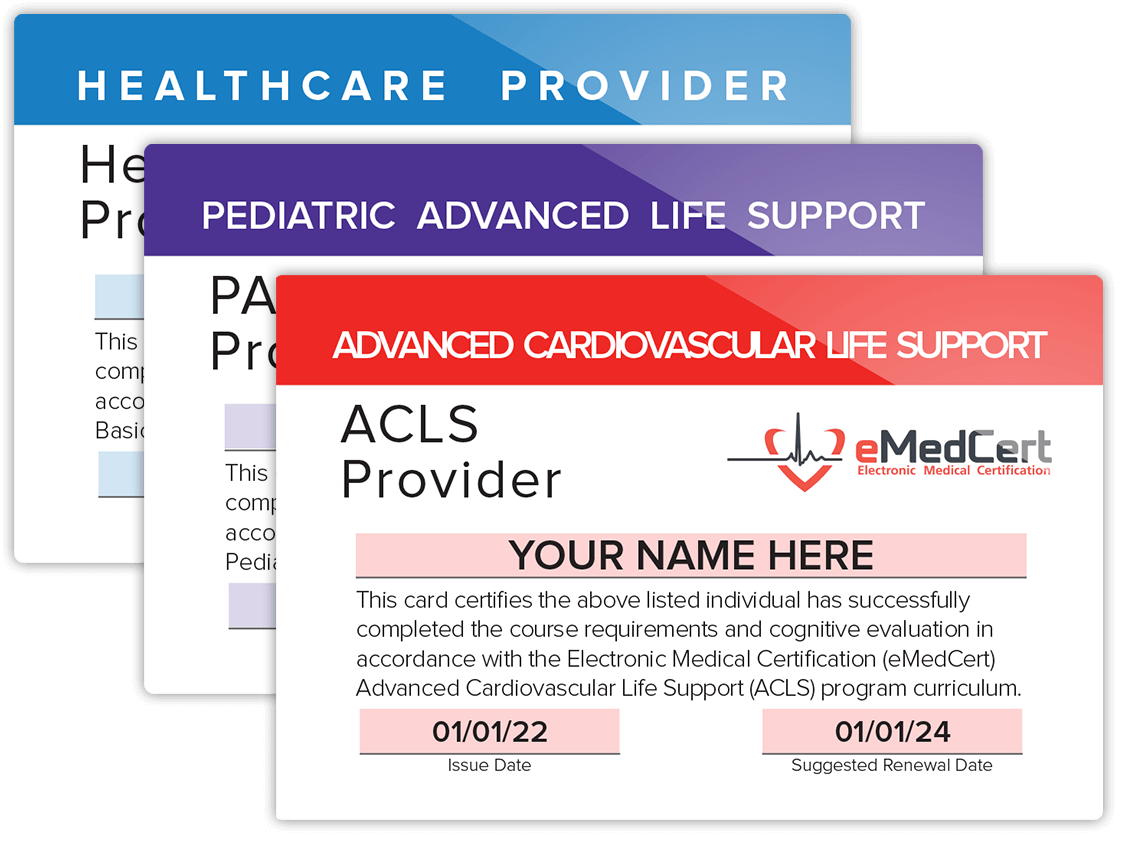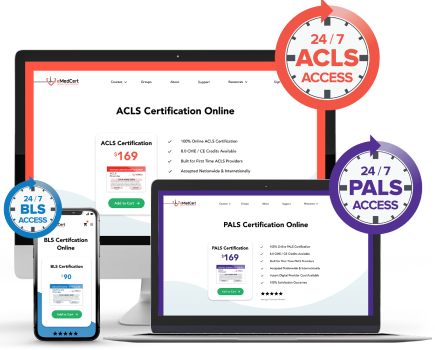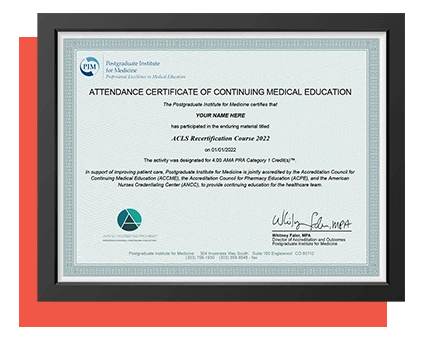Certifications for Nurses
Recertification Bundle

Improve your patient care and elevate your nursing career with these specialized nursing certifications. Get certified in ACLS, PALS, and/or BLS from the comfort of your own home with eMedCert’s fully online and accredited courses. Learn more about these courses and other nursing certifications below!

The Efficient, Affordable Way to Certify
The eMedCert Online ACLS (Advanced Cardiac Life Support), PALS (Pediatric Advanced Life Support), and BLS (Basic Life Support) Certification and Recertification courses are built specifically for the demanding lifestyle required of 21st-century medical students and healthcare professionals. Our 100% online courses give you control of your ACLS, PALS, and BLS Certifications – take them when you want, where you want, and at your own pace. Complete your courses with efficiency from your desktop, tablet, or smartphone.
Credible and Affordable ACLS, BLS, and PALS Certifications
Our ACLS, PALS, and BLS training is accredited through our partnership with the Postgraduate Institute for Medicine (PIM) and also by the California Board of Registered Nursing (CA BRN). We provide AMA, ANCC, ACPE, and ADA continuing education credits, redeemable upon completion of the ACLS, PALS, and BLS Certification or Recertification courses.
eMedCert and our ACLS, PALS, and BLS material undergo routine audits by regulatory organizations and 3rd-party clinical teams. Our internal medical team continuously works to ensure compliance, accuracy, and integrity.

Ready To Begin?
Complete your registration and begin reviewing your material in less than two minutes. Certification has never been this easy!
Online ACLS, PALS, and BLS Recertification Bundle Details
Our ACLS, PALS, and BLS Recertification courses are designed to deliver the best online certification experience that can accompany your busy schedule.
- Start When Ready -- No Time Limit -- Available 24/7
- Finish in a Single Sitting or Save Your Progress and Return Later
- Instant Exam Results & Unlimited Exam Retakes
- No On-Site Skills Check Required
- Digital ACLS Provider Card Available Immediately for Download
- 10.0 AMA, ANCC, ACPE or ADA CME Credits Available
Trusted By:





Certifications for Nurses
Certifications for nurses are professional credentials that validate a nurse's specialized knowledge and skills in a specific area of practice. Nursing certifications allow nurses to demonstrate their expertise, enhance their professional development, and potentially advance their careers. In many cases, they’re also necessary to secure employment.
There are dozens of nursing certifications available covering various specialties and practice areas. These certifications focus on critical care, pediatrics, gerontology, psychiatric nursing, oncology, and many other fields. Each certification has its own set of requirements, typically necessitating educational prerequisites, clinical experience, and successful completion of an examination, for instance.
Continuing education for nurses is vital to maintaining and renewing nursing certifications. These certifications generally have renewal cycles, during which nurses must complete a certain number of continuing education hours or participate in professional development activities to stay current in their knowledge and skills.
Nursing certifications help validate nurses’ expertise and competency, enhancing their professional credibility and recognition. Certifications can also broaden career opportunities by distinguishing nurses in the job market and increasing their chances of obtaining higher-level positions. Nursing certifications may also lead to higher salaries, as employers often recognize the added value that certified nurses bring to the workplace.
ACLS Certification for Nurses
For starters – what is ACLS certification for nurses? In basic terms, it is a specialized certification that focuses on the management of cardiac emergencies and life-threatening situations. It is an important certification for nurses who work in critical care settings, emergency departments, or other healthcare environments where the ability to respond swiftly and effectively to cardiac emergencies is crucial.
ACLS certification for nurses is included in the nursing certifications list required by many healthcare institutions and organizations. It demonstrates a nurse's advanced knowledge and skills in assessing and treating cardiac arrest, acute coronary syndromes, stroke, and other cardiopulmonary emergencies. Nurses with ACLS certification are trained to provide interventions such as cardiopulmonary resuscitation (CPR), defibrillation, administering medications, and managing advanced airway techniques.
ACLS classes for nurses are typically offered through specialized training programs, either in-person or online. These classes provide comprehensive instruction on the recognition and management of cardiac emergencies, as well as hands-on practice in simulation scenarios. Nurses learn to assess the patient's condition, interpret cardiac rhythms, and make appropriate treatment decisions within the ACLS guidelines.
ACLS training for nurses also emphasizes effective communication and teamwork in high-stress situations. Nurses learn how to coordinate efforts with other healthcare providers, prioritize interventions, and ensure a coordinated approach to patient care during cardiac emergencies.
Obtaining ACLS certification provides nurses with valuable continuing education credits. Many nursing boards and regulatory bodies recognize ACLS training as a means of fulfilling continuing education requirements. This allows nurses to maintain their licensure while simultaneously enhancing their skills in cardiac care. ACLS continuing education credits for nurses ensure they remain up-to-date with the latest evidence-based practices, technological advances, and healthcare delivery changes.
For more information on the continuing education offered for all eMedCert courses, please see our Continuing Education page.
ACLS certification for nurses is a valuable credential that demonstrates advanced knowledge and skills in assessing and treating life-threatening cardiac conditions. An ACLS class provides nurses with comprehensive training, emphasizing effective communication and teamwork. Obtaining an ACLS certificate allows nurses to earn continuing education credits while enhancing their abilities to respond to critical cardiac events.
BLS Certification for Nurses
Much like ACLS training, Basic Life Support training for nurses is a fundamental certification that equips healthcare professionals with the necessary skills to respond during life-threatening emergencies. It focuses on basic resuscitation techniques and cardiopulmonary resuscitation to maintain vital functions until advanced medical assistance arrives.
BLS certification for nurses is essential for nurses working in various healthcare settings, including hospitals, clinics, ambulatory care centers, and community healthcare organizations. It ensures that nurses possess the knowledge and skills needed to provide immediate care during cardiac arrest, choking incidents, or other medical emergencies.
To obtain BLS certification, nurses are required to complete a BLS training course, which typically includes both theoretical and practical components. A Basic Life Support course for nurses generally covers topics such as recognizing cardiac arrest, performing high-quality CPR, using automated external defibrillators (AEDs), and providing basic airway management. BLS classes for nurses are commonly offered by certified training providers, and the training can be completed in person or through online platforms.
BLS certification for nurses is typically valid for a period of two years. After this period, nurses are required to renew their certification by completing a BLS recertification course. The recertification process ensures that nurses stay updated with the latest techniques and guidelines in basic life support. It reinforces their knowledge and skills, allowing them to respond effectively to emergencies and provide high-quality care.
Other reputable organizations may also offer BLS training for nurses. It is important to ensure that the training provider is recognized and follows established guidelines.
PALS Certification for Nurses
PALS (Pediatric Advanced Life Support) certification for nurses is a specialized certification that focuses on the management of pediatric emergencies and life-threatening conditions. It is designed to equip healthcare professionals, including nurses, with the knowledge and skills necessary to provide the best possible care to infants and children in critical situations.
PALS certification for nurses is specifically tailored to address pediatric patients' unique physiological and anatomical differences. It covers topics such as pediatric assessment, recognition and treatment of respiratory distress and failure, cardiac arrest management, and the use of specialized equipment and medications in pediatric resuscitation.
A PALS nursing certification is particularly beneficial for nurses working in pediatric units, neonatal intensive care units (NICUs), emergency departments, and other healthcare settings where pediatric patients are treated. It enhances a nurse's ability to respond effectively and efficiently to pediatric emergencies, improving patient outcomes and reducing the risk of complications.
PALS training for nurses is typically offered through specialized courses conducted by certified training providers. These courses incorporate both theoretical knowledge and practical skills training. Nurses learn to assess and stabilize pediatric patients, interpret cardiac rhythms specific to pediatrics, and make appropriate treatment decisions based on the PALS algorithms.
What sets PALS certification apart from other certifications is its exclusive focus on pediatric patients instead of adults. While ACLS and BLS certifications encompass a broader range of age groups and conditions, PALS nursing certification hones in specifically on the unique needs and challenges of infants and children.
Nurses seeking PALS certification can expect to engage in simulation scenarios and examinations to demonstrate their competency in pediatric resuscitation and critical care. Like other certifications, PALS for nurses typically has a validity period and requires renewal through a PALS recertification course to ensure that nurses stay updated with the latest guidelines and practices in pediatric advanced life support.
Nursing Certifications Online
Nursing certifications online provide a convenient and flexible option for registered nurses (RNs) to obtain and maintain their certifications. Online platforms offer a range of nursing certifications, allowing nurses to access high-quality education and training from the comfort of their own homes or workplaces.
To obtain online nursing certifications, nurses typically need to meet specific requirements set by the certification board or organization. For example, the requirements for an online BLS certification may include completing a specified number of hours of training, passing an online examination, and demonstrating proficiency in essential life-saving skills such as CPR and AED usage. Similarly, online ACLS certification and online PALS certification may require the completion of a comprehensive online course and passing a final assessment.
Basic life support online certification provides nurses with the necessary knowledge and skills to respond effectively in cardiac emergencies, while online ACLS certification focuses on advanced management of cardiac arrest and related conditions. Online PALS certification equips nurses with specialized skills in pediatric emergency care.
Benefits of Nursing Certifications
Nursing certifications offer numerous benefits to nurses, including professional growth, expanded career opportunities, and enhanced patient care. By obtaining additional certifications, nurses can specialize in specific areas of practice and demonstrate their expertise and commitment to excellence.
The best certifications for ICU nurses may include critical care certifications such as CCRN (Critical Care Registered Nurse) or CSC (Cardiac Surgery Certification). These certifications validate advanced knowledge and skills in managing critically ill patients and provide a competitive edge in the ICU setting.
Extra certifications for nurses, such as ACLS, can significantly benefit their practice. ACLS certification equips nurses with the ability to manage cardiac emergencies, interpret ECG rhythms, and administer ACLS medications. This certification is particularly valuable in emergency departments, critical care units, and other healthcare settings where quick and efficient response to cardiac events is crucial.
eMedCert is a reputable provider that offers ACLS, PALS, and BLS certifications. Their online platform provides convenience and flexibility, allowing nurses to complete certifications at their own pace and from any location. The entirely online ACLS, PALS, and BLS courses are comprehensive and up-to-date, utilizing interactive modules and virtual simulations to enhance learning. Furthermore, eMedCert's certifications are accredited and recognized, ensuring their value and credibility within the nursing profession.
Overall, the benefits of nursing certifications are substantial. They enhance nurses' knowledge and skills, provide specialized expertise, and contribute to improved patient outcomes. The benefits of ACLS certification are manifold – certifications like ACLS can open up new career opportunities and increase earning potential. Choosing a trusted provider like eMedCert ensures high-quality certifications that align with industry standards and meet the evolving needs of the healthcare field.